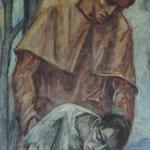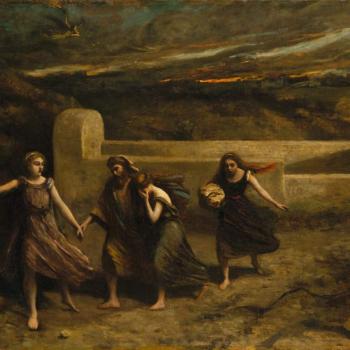
Tomorrow is Good Friday, which means that you’ll likely hear all about how the death of Jesus spares us from the wrath of God. You’ll hear about how Jesus was a substitutionary sacrifice, one who died in our place, so that God wouldn’t have to violently punish us for our sins (the ones who believe, anyway). Because . . . justice. Or wrath. Or honor. Or something like that. Then, you’ll likely be pointed to many passages throughout the Bible, from Genesis 22 to 2 Corinthians 5:21, but especially to Isaiah 53:5. And, of course, because you are a human being (like we all are), your inclination will be to read them through a pro-sacrificial grid. Because, well, that’s just what we all seem to default to.
But what if we took a different approach? What if we put aside our presupposed sacrificial tendencies and read passages like, say, Isaiah 53 with different eyes? Would we see that there may be something else going on in the text? That would be my hope.
Now, before any discussion about how Jesus relates to the Suffering Servant poem of Second Isaiah, we must mention that the text is, first and foremost, “related to known historical facts,” as James G. Williams puts it. That is to say, we should view the poem as presenting the nation of Israel as a suffering servant of Yahweh (Williams, The Bible, Violence, and the Sacred, 159). However, and more importantly for our purposes, we should also notice how Jesus can easily be read back into this poem, as he certainly fits the description. But we’ll get to that in just a moment. First, we need to explore the opening declaration from God so that we can then contrast that with the collective voice of the community.
In Isaiah 52:13–15, the divine voice dramatically begins:
See, my servant will act wisely; he will be raised and lifted up and highly exalted. Just as there were many who were appalled at him—his appearance was so disfigured beyond that of any human being and his form marred beyond human likeness—so he will sprinkle many nations, and kings will shut their mouths because of him. For what they were not told, they will see, and what they have not heard, they will understand.
What God is said to be describing regarding the horror that befalls his servant is antithetical to how God created humanity (see Genesis 1:26–27). Anthony Bartlett observes the connection this way: “The picture is a contradiction of Genesis where man and woman are made in the image of God; it is both a human and a theological reversal, an absolute dehumanization.” Further, it is also God’s way of redefining power. Rather than kings shutting their mouths due to being overwhelmed by the military might of their enemy—or even, their God or gods—they will shut them by a humble servant “so disfigured beyond that of any human being” (Isaiah 52:14).
In contrast to the divine voice in 52:13 – 15, chapter 53 starts off collectively, that is, from the viewpoint of the community:
For he grew up before him like a young plant, and like a root out of dry ground; he had no form or majesty that we should look at him, nothing in his appearance that we should desire him. He was despised and rejected by others; a man of suffering and acquainted with infirmity; and as one from whom others hide their faces he was despised, and we held him of no account (53:2–3).
As those of us who study Girard’s mimetic theory have discovered, scapegoats such as the one presented above are often those who stand out amongst the other community members—those despised, those who are sick, those whose roots grow out of dry ground, one could say. Their purpose, of course, is to bear the violence of the community so as to become the bringer of peace. And as I have stated in many places, all of this violence is—and this is key—in the minds of the mob, “divinely ordained.” This is why, I believe, Isaiah 53:4–10a reads as follows:
Surely he has borne our infirmities and carried our diseases; yet we accounted him stricken, struck down by God, and afflicted. But he was wounded for our transgressions, crushed for our iniquities; upon him was the punishment that made us whole, and by his bruises we are healed. All we like sheep have gone astray; we have all turned to our own way, and the Lord has laid upon on him the iniquity of us all. He was oppressed, and he was afflicted, yet he did not open his mouth; like a lamb that is led to the slaughter, and like a sheep that before its shearers is silent, so he did not open his mouth. By a perversion of justice was he taken away. Who could have imagined his future? For he was cut off from the land of the living, stricken for the transgression of my people. They made his grave with the wicked and his tomb with the rich, although he had done no violence, and there was no deceit in his mouth. Yet it was the will of the Lord to crush him with pain.
Certainly, this looks like a divinely-ordained lynching. Notice how the collective voice puts their actions so obviously in the category of “God’s will” by attaching “we” to “God/the Lord.”
- Verse 4: We accounted him stricken . . .
- Verse 4: Struck down by God, and afflicted.
- Verse 6: The Lord has laid on him the iniquity of us all.
- Verse 10: It was the will of the Lord to crush him . . .
Over and over, in our many myths and tales, we have seen that the violence we pour onto scapegoats is believed to be divine in origin. It is the will of the gods, we say. Verses 4–10 are no different.
But God, in verses 11–12, clarifies what his righteous will is in his response to the community:
Out of his anguish he shall see light; he shall find satisfaction through his knowledge. The righteous one, my servant, shall make many righteous, and he shall bear their iniquities. Therefore I will allot him a portion with the great, and he shall divide the spoil with the strong; because he poured out himself to death, and was numbered with the transgressors; yet he bore the sin of many, and made intercession for the transgressors.
With our sacrificial glasses put to the side for a moment, what seems fairly clear here is not that the servant gives up his life to satisfy the wrath of God—that would have to be read into the text—rather, the servant willingly gives up his life (nefesh) non-violently (Isaiah 53:9) for the very people who put him to death. He sees the profundity of what he is suffering through and so, gains an understanding and a knowledge that makes “many” righteous (Isaiah 53:11). The knowledge that the servant earns is a recognition of both God’s desires and of what it means to be human. Anthony Bartlett calls it a “new theological-anthropological truth.” To be righteous—that is to say, to be like God—is to be like the suffering servant, the one who has no violence in him (Isaiah 53:9). James G. Williams drives this point further home in the following: “It wasn’t God who caused suffering, it was the oppressors. As the divine voice says in an oracle found in chapter 54: ‘If any one stirs up strife, it is not from me; whoever stirs up strife with you shall fall because of you.’ ‘Strife’—the conflict of mimetic rivalry that results in violence—does not come from God.”
All that being said, will any of this change the minds of those who insist upon a penal substitutionary view of the Cross? Probably not. That really wasn’t my point. Sacrificial logic is so ingrained into our DNA that our view of God, and Jesus, and how atonement works, will probably continue to be viewed through this lens. But for those at least willing to shed their sacrificial tendencies, this one’s for you. I hope this helped a bit.
Cheers.













